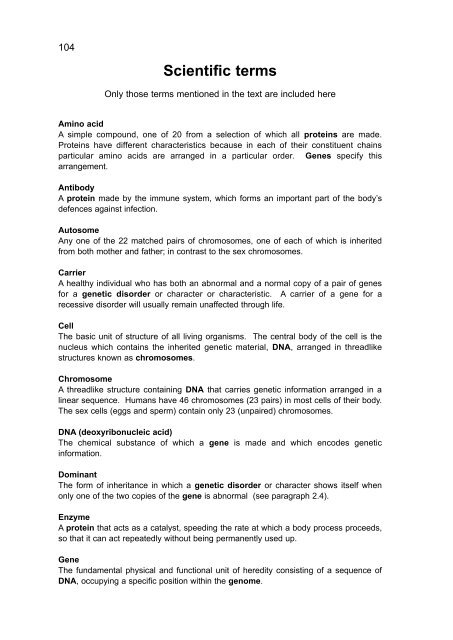Genetic screening: ethical issues - Nuffield Council on Bioethics
Genetic screening: ethical issues - Nuffield Council on Bioethics
Genetic screening: ethical issues - Nuffield Council on Bioethics
Create successful ePaper yourself
Turn your PDF publications into a flip-book with our unique Google optimized e-Paper software.
104<br />
Scientific terms<br />
Only those terms menti<strong>on</strong>ed in the text are included here<br />
Amino acid<br />
A simple compound, <strong>on</strong>e of 20 from a selecti<strong>on</strong> of which all proteins are made.<br />
Proteins have different characteristics because in each of their c<strong>on</strong>stituent chains<br />
particular amino acids are arranged in a particular order. Genes specify this<br />
arrangement.<br />
Antibody<br />
A protein made by the immune system, which forms an important part of the body’s<br />
defences against infecti<strong>on</strong>.<br />
Autosome<br />
Any <strong>on</strong>e of the 22 matched pairs of chromosomes, <strong>on</strong>e of each of which is inherited<br />
from both mother and father; in c<strong>on</strong>trast to the sex chromosomes.<br />
Carrier<br />
A healthy individual who has both an abnormal and a normal copy of a pair of genes<br />
for a genetic disorder or character or characteristic. A carrier of a gene for a<br />
recessive disorder will usually remain unaffected through life.<br />
Cell<br />
The basic unit of structure of all living organisms. The central body of the cell is the<br />
nucleus which c<strong>on</strong>tains the inherited genetic material, DNA, arranged in threadlike<br />
structures known as chromosomes.<br />
Chromosome<br />
A threadlike structure c<strong>on</strong>taining DNA that carries genetic informati<strong>on</strong> arranged in a<br />
linear sequence. Humans have 46 chromosomes (23 pairs) in most cells of their body.<br />
The sex cells (eggs and sperm) c<strong>on</strong>tain <strong>on</strong>ly 23 (unpaired) chromosomes.<br />
DNA (deoxyrib<strong>on</strong>ucleic acid)<br />
The chemical substance of which a gene is made and which encodes genetic<br />
informati<strong>on</strong>.<br />
Dominant<br />
The form of inheritance in which a genetic disorder or character shows itself when<br />
<strong>on</strong>ly <strong>on</strong>e of the two copies of the gene is abnormal (see paragraph 2.4).<br />
Enzyme<br />
A protein that acts as a catalyst, speeding the rate at which a body process proceeds,<br />
so that it can act repeatedly without being permanently used up.<br />
Gene<br />
The fundamental physical and functi<strong>on</strong>al unit of heredity c<strong>on</strong>sisting of a sequence of<br />
DNA, occupying a specific positi<strong>on</strong> within the genome.
















